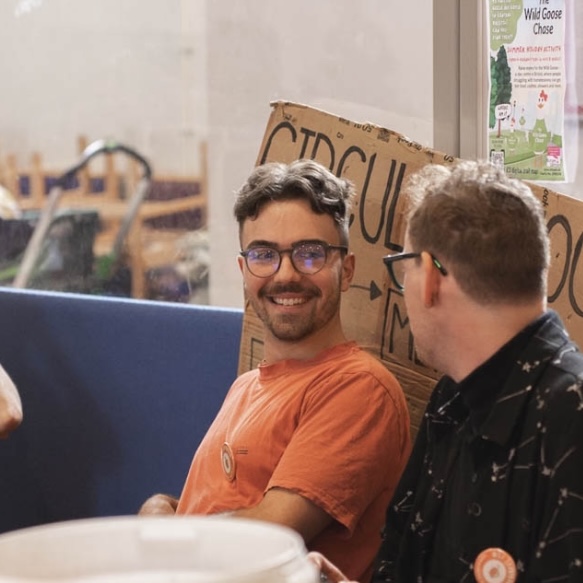What Generation Soil Does: Turning Food Waste into Living Soil
- Alex Montgomery
- Sep 24, 2024
- 4 min read
Updated: Dec 26, 2025
At Generation Soil CIC, we transform Bristol’s food waste into biologically complete, living soil.
Unlike conventional compost, living soil cannot be mass-produced. It requires time, care, knowledge, and a commitment to working locally. Our process is deliberately slow and place-based, designed to nurture soil life rather than strip it away.
Once ready, this living soil is returned to members and projects across the city, closing the loop between food, waste, soil, and community. This is not waste disposal. It is regeneration.

What Is Living Soil?
Living soil is the foundation of life on Earth. Around 95 percent of the food we eat depends on it.
Beneath our feet exists a vast, interconnected ecosystem made up of bacteria, fungi, nematodes, protozoa, arthropods, and mycelial networks. Together, these organisms form what is known as the soil food web. They break down organic matter, weather minerals, retain nutrients, and make them available to plants when they are needed.
The benefits of living soil go far beyond plant nutrition.
Healthy soil creates structure, prevents compaction, improves water infiltration, and builds long-term resilience. Fungal networks, particularly mycelium, form intricate underground pathways that help soil absorb and retain water, reducing runoff and flood risk. Living soil acts like a sponge, holding moisture during dry periods while keeping ecosystems alive and functioning.
This makes living soil essential not only for food production, but for climate resilience, biodiversity, and human health.
How We Make Living Soil
Our living soil begins with something most people see as waste.
Food scraps collected from homes and businesses across Bristol become the raw material for regeneration. Instead of being burned, digested, or diluted, this food waste is treated as a valuable biological resource.
Step 1: Fermentation Using Bokashi
Once collected, food waste is treated with bokashi, a blend of bran, molasses, and beneficial microorganisms. This fermentation stage stabilises the waste, suppresses pathogens, and preserves nutrients that are often lost in industrial processes.
Fermentation kickstarts decomposition while keeping the biological value of the food intact.
Step 2: Aerobic Composting
The fermented food waste is then combined with locally sourced woodchip, biochar, and natural amendments. This mixture creates the right balance of carbon, nitrogen, air, and moisture to support microbial activity.
During this phase, bacteria and fungi rapidly break down organic material, generating heat and transforming waste into rich compost.
Step 3: Maturation and Soil Development
Finally, the compost is left to mature in static bays. This stage allows fungal networks to develop, microbial communities to stabilise, and nutrients to become fully integrated into a living soil system.
The result is not just compost, but biologically complete soil, ready to nourish plants and ecosystems.

“But I Already Get My Food Waste Collected by the Council”
This is a common and reasonable question.
Bristol City Council and partners like GenEco process food waste through anaerobic digestion. This system is effective at scale and plays an important role in diverting waste from landfill. It produces biogas for energy and a digestate that can be spread on land.
We are not here to dismiss that work.
However, anaerobic digestion is designed primarily for energy recovery, not soil regeneration.
The digestate produced often contains limited biological life and, in some cases, contamination. It is not designed to rebuild soil ecosystems or grow nutrient-dense food.
Generation Soil CIC focuses on quality over scale. Our approach prioritises soil biology, carbon storage, and ecosystem health. We produce smaller quantities of much higher-quality soil, specifically for food growing and regeneration.
Local Solutions to a Global Problem
Climate change, biodiversity loss, and soil degradation are global challenges, but the solutions often start locally.
By collecting food waste and turning it into living soil, we:
Improve soil health by increasing organic matter and microbial life
Reduce carbon emissions by keeping food waste out of landfill and digestion
Enhance biodiversity above and below ground
Improve water retention and reduce flood risk
Reduce reliance on fossil fuel-derived fertilisers
This is regeneration in practice.
The Impact of Your Choices
Every time you scrape leftovers from your plate, a choice is being made.
That food waste can either disappear into an industrial system where its biological value is diluted, or it can become part of a regenerative loop that restores soil and supports local food production.
Choosing Generation Soil CIC means choosing to keep nutrients local, biology intact, and value in the community.
It is a small action with far-reaching consequences.
Join Us in Building a Regenerative Future
At Generation Soil CIC, we believe that healthy soils are the foundation of healthy communities.
By turning food waste into living soil, we are rebuilding the systems that feed us, protect ecosystems, and support long-term wellbeing.
Whether you are a household or a business in Bristol, your food waste can be part of this regenerative process.
Together, we can transform food waste into fertile, living soil and build a future where food systems are resilient, ecosystems thrive, and communities prosper.




Comments